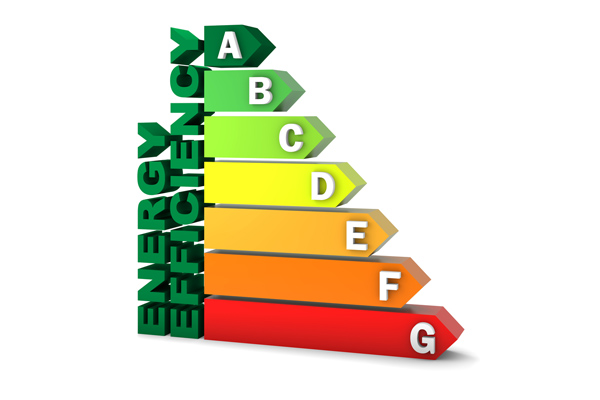What Does An Air Conditioner’s SEER Rating Actually Mean?
 If you have been shopping for an air conditioning system lately, you will come across the term “SEER rating“. The SEER rating is an important factor to consider to ensure that you get an efficient HVAC system. A good SEER rating translates into less energy consumption without sacrificing indoor comfort. The U.S. EIA (Energy Information Administration) suggests that residential HVAC systems should carry at least a 14 SEER rating. There are, however, different SEER requirements per state. So how do you ensure that your new air conditioning system is energy efficient?
If you have been shopping for an air conditioning system lately, you will come across the term “SEER rating“. The SEER rating is an important factor to consider to ensure that you get an efficient HVAC system. A good SEER rating translates into less energy consumption without sacrificing indoor comfort. The U.S. EIA (Energy Information Administration) suggests that residential HVAC systems should carry at least a 14 SEER rating. There are, however, different SEER requirements per state. So how do you ensure that your new air conditioning system is energy efficient?
What Is A SEER Rating?
SEER is short for Seasonal Energy Efficiency Ratio. This rating measures the cooling output of air conditioning systems based on their total consumption of energy within a 12-month period. The rating can range from 13-21, with the higher figure indicating higher efficiency.
Why Is An Air Conditioner SEER Rating Important?

Knowing the SEER rating of an AC system is extremely helpful to help you choose the right system in terms of function, features, and energy consumption. Here are the benefits you can expect:
- Lower Cooling Costs: Air conditioning systems with higher SEER ratings consume less energy but are capable of cooling your home at the desired temperatures. This means that you get the comfort you want for a lower price.
- Better Comfort: Professional HVAC contractors say that the basic air conditioner must be capable of lowering the temperature of a four-bedroom home by 10° F within 3 hours. Of course, there are factors that come into play, such as the age and size of the AC unit. However, given the correct SEER rating, you should be able to enjoy the best comfort possible at home.
- Eco-Friendly Cooling: Because the AC unit consumes less energy, it does not require as much from the grid and emits a lower level of greenhouse gases. As such, an HVAC system with a higher SEER rating is more environment-friendly.
Understanding Air Conditioner SEER Rating
Generally, an HVAC system that has a SEER rating of at least 15 should be good. However, there are factors that you should also consider, including your preferred rate of energy consumption, your cooling needs, and the size of your house. Keep in mind, though, that high SEER ratings translate to better efficiency. To ensure that your HVAC system is a good fit for your home, ask a professional HVAC technician to help “size” the system based on the total area and design of your home. Although an air conditioner with a SEER rating of 14 can efficiently cool a home with two bedrooms, it will not work as well for a home with five bedrooms. You will need a system that comes with a better SEER rating.
Calculating The SEER Rating

There is a way to calculate the cooling system’s ideal SEER rating. To get the cooling output, you will have to multiply the BTU (British Thermal Unit) per hour and multiply it by the number of hours the cooling unit is used on a daily basis. Take the figure and multiply it by the number of days that the AC unit works in a given year. For example:
5,000 BTU/h X 12 hours of cooling daily X 180 days a year:
You will have 10,800,000 BTUs a year
Let’s say you have an annual total energy consumption of 700,000Wh. Use this figure to divide 10,800,000 BTUs a year and you have a 15.4 or 15 SEER rating.
How Do I Look For The SEER Rating On My AC?
All HVAC manufacturers are required by the U.S. Dept. of Energy to clearly indicate the cooling system’s SEER rating on the unit itself. If their models qualify for an Energy Star label, this label must be indicated on the unit as well. The SEER rating is usually found on a black and yellow sticker, which is on either side of the outdoor or condenser unit. The SEER rating figure should be clearly indicated on that sticker.
You could also look for the SEER rating on the air handler. If you cannot find the rating, go online and enter the unit’s serial number, model number, and manufacturer on a search engine. Alternatively, you could also get in touch with the manufacturer.
Of course, you can always call your HVAC contractor to help you out. They will be able to tell you the features of your air conditioning system and find the SEER rating on the unit just in case it was not clearly stated by the manufacturer.
What Happens If A Cooling System Is Mismatch?

If you want your air conditioner to perform optimally, the air handler should be a match to the condenser unit. This is the reason why manufacturers produce air handlers that are a match only with specific condensers. When HVAC contractors install air handlers, they must be a match to the condensers. Unfortunately, there are times when a mismatch occurs, usually at the hands of an inexperienced HVAC contractor.
Air Conditioner Size
Another issue you need to watch out for is the air conditioner size. If it is not appropriate for your home, this will also become a mismatch.
- Oversized AC Unit: If the AC is too large for your room or home, it will short-cycle. Short cycling is a problem in that the AC unit will fail at filtering air efficiently and removing humidity. As a result, you get overall discomfort and bad indoor air quality. Short cycling also means that your AC system will consume more energy. Keep in mind that energy is needed for the system to turn on and off.
- Undersized AC Unit: If, on the other hand, the AC system is undersized, it will have to work doubly hard to achieve the desired temperature and comfort level. As a result, the system will not only consume more energy but will also be more susceptible to premature wear and tear. In turn, this will lead to more frequent repairs and replacements.
- Mismatched SEER Ratings: It also will not matter if your AC system comes with a high SEER rating if it is mismatched. This is why the technician who installs your AC system must be knowledgeable enough to understand that a good match is critical to the proper functioning of the unit.
Factors You Need to Consider When Buying an AC System
There are also other important factors you need to keep in mind when choosing your AC system other than its SEER Rating. These include:
- Air Conditioner Size: The air conditioner size must match the size/cooling area of your home to avoid oversizing or undersizing.
- Price Of Air Conditioner: The cost of the unit must meet your budget.
- Air Conditioner Noise: Although low-noise air conditioning units are available, systems that make too much noise usually do so because they overwork, which means they are not a good match.
- AC System Warranty: The air conditioner warranty covers any repairs or replacements within a specified period.
Conclusion
SEER ratings are a very useful point of reference in choosing a cooling system for your home. Combine this energy efficiency rating with an ENERGY STAR certification and you will have a better idea of what to look for to reduce your energy costs and be more environmentally friendly. If you need more guidance, get in touch with your local HVAC contractor to assist you in finding the perfect HVAC for your needs.
Call Point Bay Fuel For Superior Heating & Cooling Solutions

Point Bay Fuel is the premier service provider for heating and cooling in Monmouth and Ocean Counties, New Jersey. All of our technicians hold a certification, so we can assure you that we can offer only the best services, from installations and tune-ups to repairs and replacements. We also offer the most competitive services that put your comfort, budget, and cooling needs first. If you want to know more about how you can enjoy more efficient and eco-friendly cooling, give Point Bay Fuel a call today.
Contact us now by calling (732) 349-5059 to speak to one of our home comfort specialists!
